BSBPMG518 Project Procurement Management: Tender Case Study Analysis
VerifiedAdded on 2022/09/02
|5
|1127
|32
Case Study
AI Summary
This document presents a comprehensive analysis of a project procurement case study, focusing on the role of the project manager in determining procurement needs, activities performed before going to market for goods and services, monitoring and modification of contract performance, and contractual acceptance criteria for handover. The analysis covers understanding the scope and time of supply, determining the place of supply, and implementing effective monitoring systems like the Procurement Review System (PRS). It also elaborates on contract review processes, modifications based on the needs of the parties, and acceptance criteria such as successful completion of work, adherence to budget and timeline, and achievement of project objectives. The document references relevant academic sources to support its findings, providing a robust understanding of project procurement management.
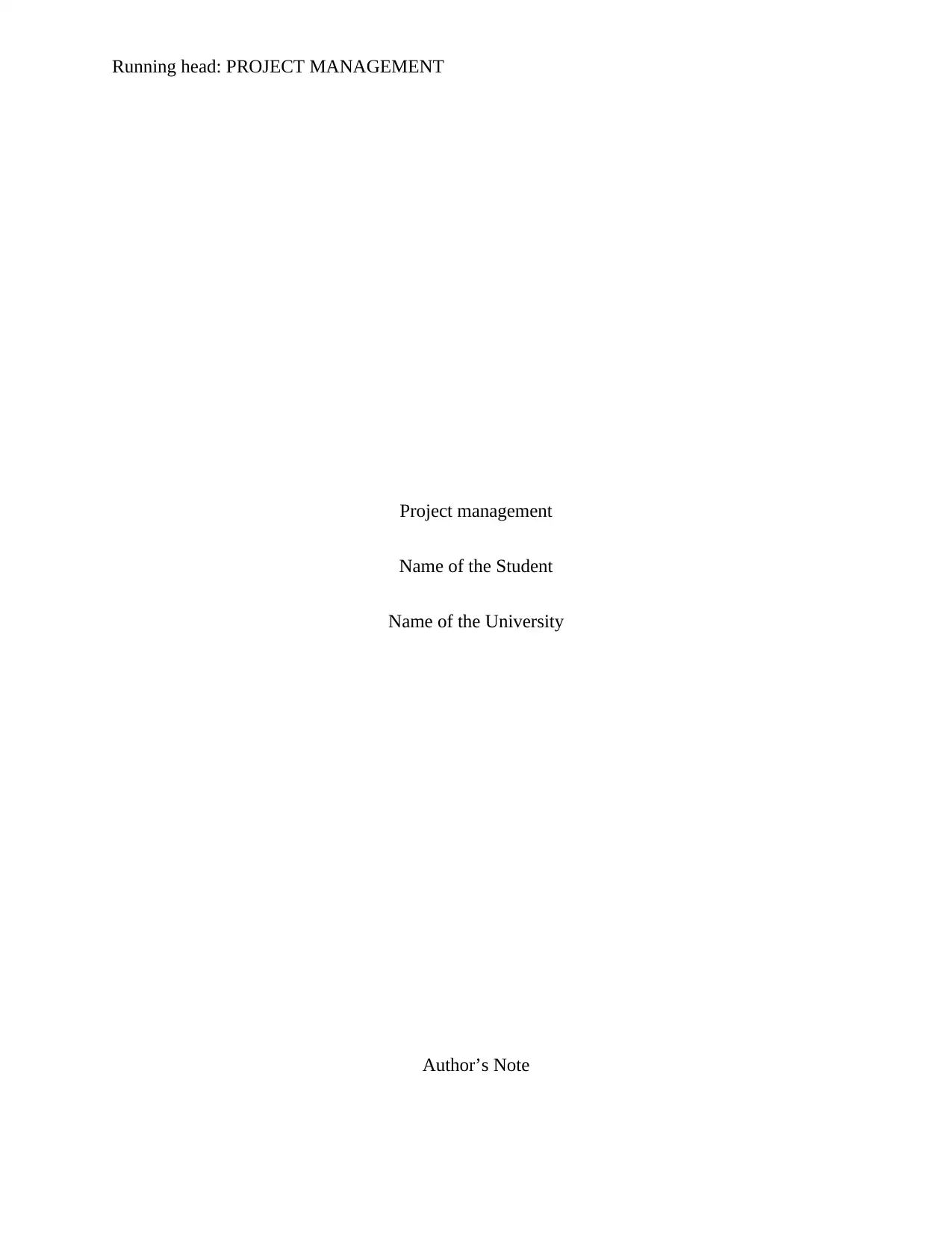
Running head: PROJECT MANAGEMENT
Project management
Name of the Student
Name of the University
Author’s Note
Project management
Name of the Student
Name of the University
Author’s Note
Paraphrase This Document
Need a fresh take? Get an instant paraphrase of this document with our AI Paraphraser
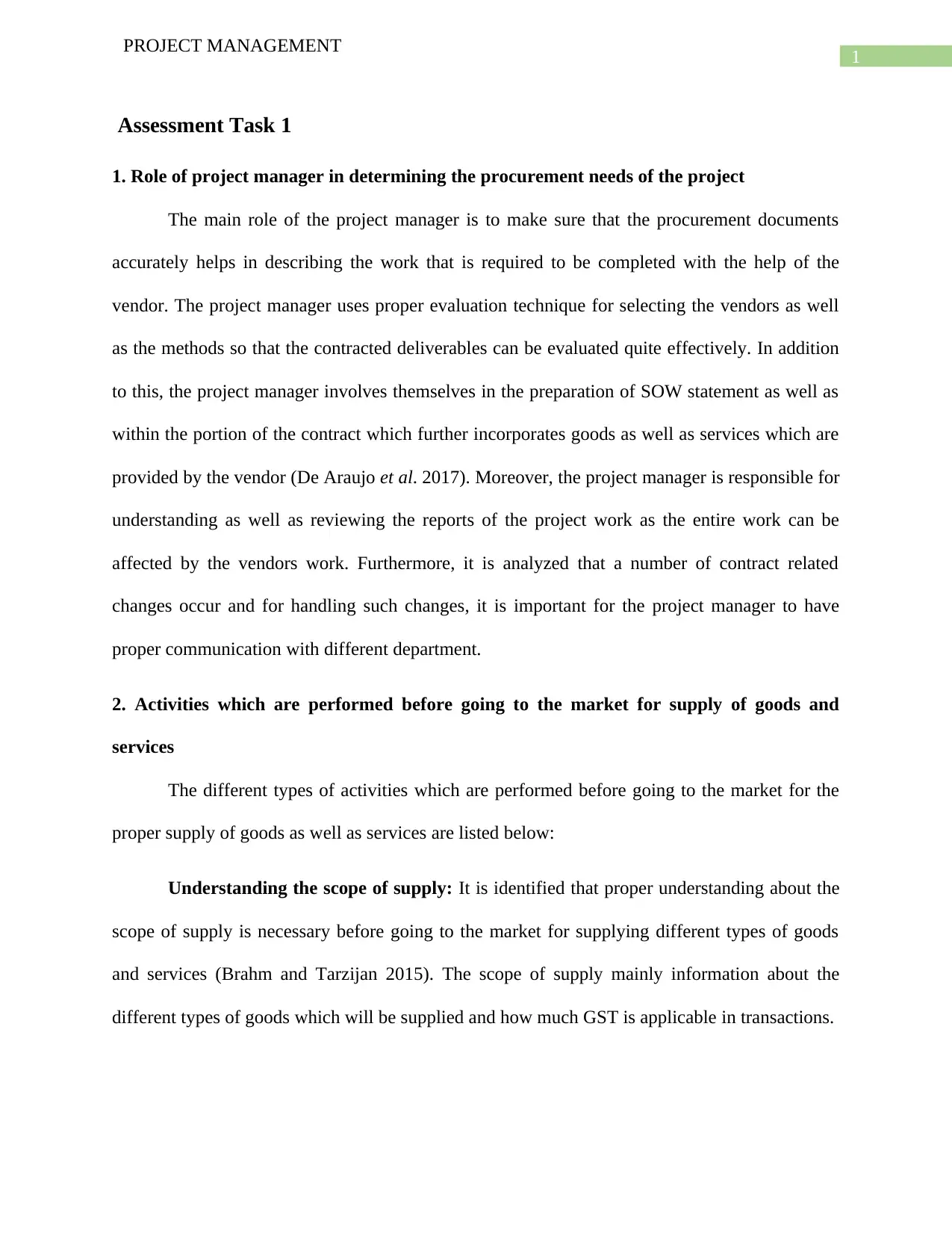
1
PROJECT MANAGEMENT
Assessment Task 1
1. Role of project manager in determining the procurement needs of the project
The main role of the project manager is to make sure that the procurement documents
accurately helps in describing the work that is required to be completed with the help of the
vendor. The project manager uses proper evaluation technique for selecting the vendors as well
as the methods so that the contracted deliverables can be evaluated quite effectively. In addition
to this, the project manager involves themselves in the preparation of SOW statement as well as
within the portion of the contract which further incorporates goods as well as services which are
provided by the vendor (De Araujo et al. 2017). Moreover, the project manager is responsible for
understanding as well as reviewing the reports of the project work as the entire work can be
affected by the vendors work. Furthermore, it is analyzed that a number of contract related
changes occur and for handling such changes, it is important for the project manager to have
proper communication with different department.
2. Activities which are performed before going to the market for supply of goods and
services
The different types of activities which are performed before going to the market for the
proper supply of goods as well as services are listed below:
Understanding the scope of supply: It is identified that proper understanding about the
scope of supply is necessary before going to the market for supplying different types of goods
and services (Brahm and Tarzijan 2015). The scope of supply mainly information about the
different types of goods which will be supplied and how much GST is applicable in transactions.
PROJECT MANAGEMENT
Assessment Task 1
1. Role of project manager in determining the procurement needs of the project
The main role of the project manager is to make sure that the procurement documents
accurately helps in describing the work that is required to be completed with the help of the
vendor. The project manager uses proper evaluation technique for selecting the vendors as well
as the methods so that the contracted deliverables can be evaluated quite effectively. In addition
to this, the project manager involves themselves in the preparation of SOW statement as well as
within the portion of the contract which further incorporates goods as well as services which are
provided by the vendor (De Araujo et al. 2017). Moreover, the project manager is responsible for
understanding as well as reviewing the reports of the project work as the entire work can be
affected by the vendors work. Furthermore, it is analyzed that a number of contract related
changes occur and for handling such changes, it is important for the project manager to have
proper communication with different department.
2. Activities which are performed before going to the market for supply of goods and
services
The different types of activities which are performed before going to the market for the
proper supply of goods as well as services are listed below:
Understanding the scope of supply: It is identified that proper understanding about the
scope of supply is necessary before going to the market for supplying different types of goods
and services (Brahm and Tarzijan 2015). The scope of supply mainly information about the
different types of goods which will be supplied and how much GST is applicable in transactions.
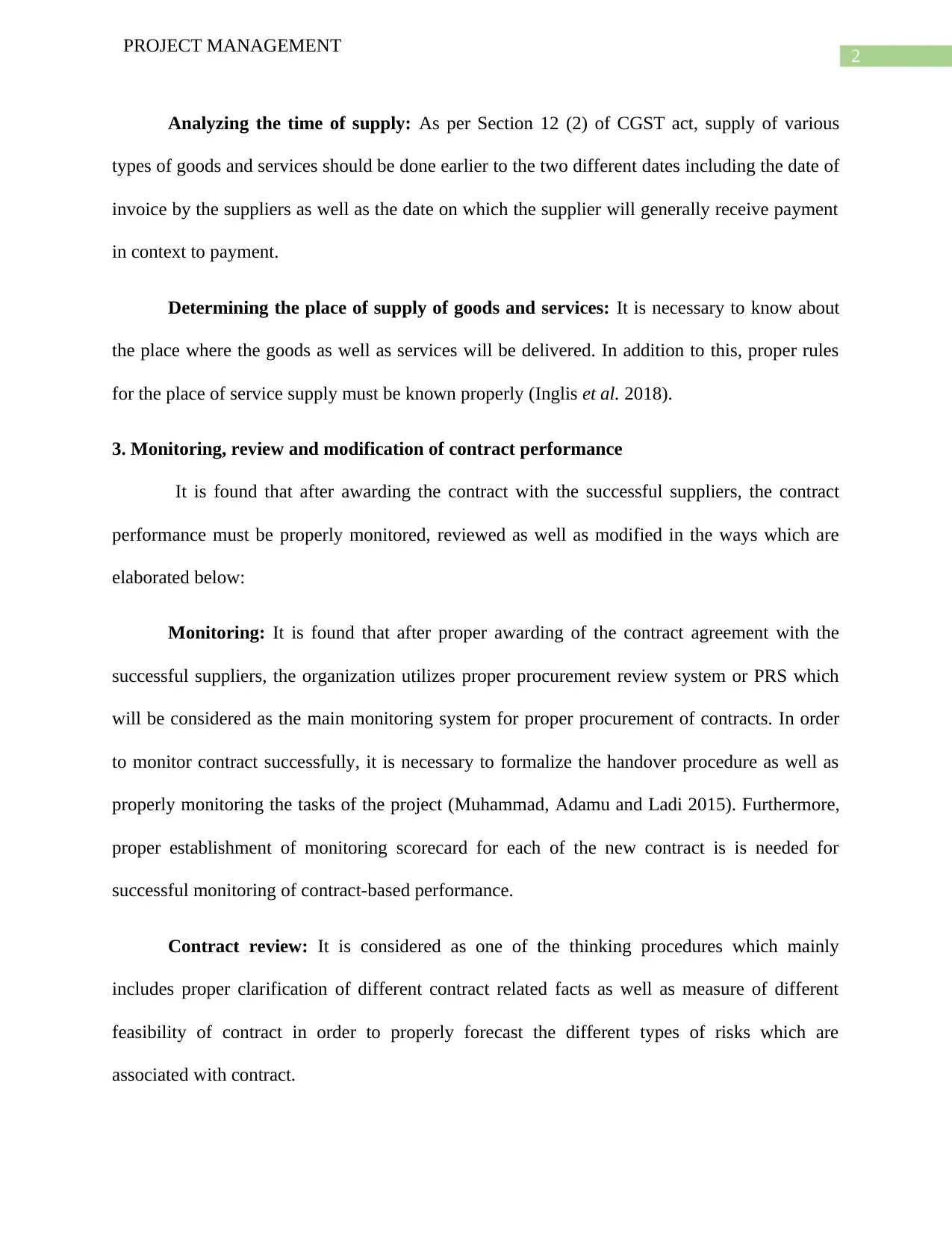
2
PROJECT MANAGEMENT
Analyzing the time of supply: As per Section 12 (2) of CGST act, supply of various
types of goods and services should be done earlier to the two different dates including the date of
invoice by the suppliers as well as the date on which the supplier will generally receive payment
in context to payment.
Determining the place of supply of goods and services: It is necessary to know about
the place where the goods as well as services will be delivered. In addition to this, proper rules
for the place of service supply must be known properly (Inglis et al. 2018).
3. Monitoring, review and modification of contract performance
It is found that after awarding the contract with the successful suppliers, the contract
performance must be properly monitored, reviewed as well as modified in the ways which are
elaborated below:
Monitoring: It is found that after proper awarding of the contract agreement with the
successful suppliers, the organization utilizes proper procurement review system or PRS which
will be considered as the main monitoring system for proper procurement of contracts. In order
to monitor contract successfully, it is necessary to formalize the handover procedure as well as
properly monitoring the tasks of the project (Muhammad, Adamu and Ladi 2015). Furthermore,
proper establishment of monitoring scorecard for each of the new contract is is needed for
successful monitoring of contract-based performance.
Contract review: It is considered as one of the thinking procedures which mainly
includes proper clarification of different contract related facts as well as measure of different
feasibility of contract in order to properly forecast the different types of risks which are
associated with contract.
PROJECT MANAGEMENT
Analyzing the time of supply: As per Section 12 (2) of CGST act, supply of various
types of goods and services should be done earlier to the two different dates including the date of
invoice by the suppliers as well as the date on which the supplier will generally receive payment
in context to payment.
Determining the place of supply of goods and services: It is necessary to know about
the place where the goods as well as services will be delivered. In addition to this, proper rules
for the place of service supply must be known properly (Inglis et al. 2018).
3. Monitoring, review and modification of contract performance
It is found that after awarding the contract with the successful suppliers, the contract
performance must be properly monitored, reviewed as well as modified in the ways which are
elaborated below:
Monitoring: It is found that after proper awarding of the contract agreement with the
successful suppliers, the organization utilizes proper procurement review system or PRS which
will be considered as the main monitoring system for proper procurement of contracts. In order
to monitor contract successfully, it is necessary to formalize the handover procedure as well as
properly monitoring the tasks of the project (Muhammad, Adamu and Ladi 2015). Furthermore,
proper establishment of monitoring scorecard for each of the new contract is is needed for
successful monitoring of contract-based performance.
Contract review: It is considered as one of the thinking procedures which mainly
includes proper clarification of different contract related facts as well as measure of different
feasibility of contract in order to properly forecast the different types of risks which are
associated with contract.
⊘ This is a preview!⊘
Do you want full access?
Subscribe today to unlock all pages.

Trusted by 1+ million students worldwide
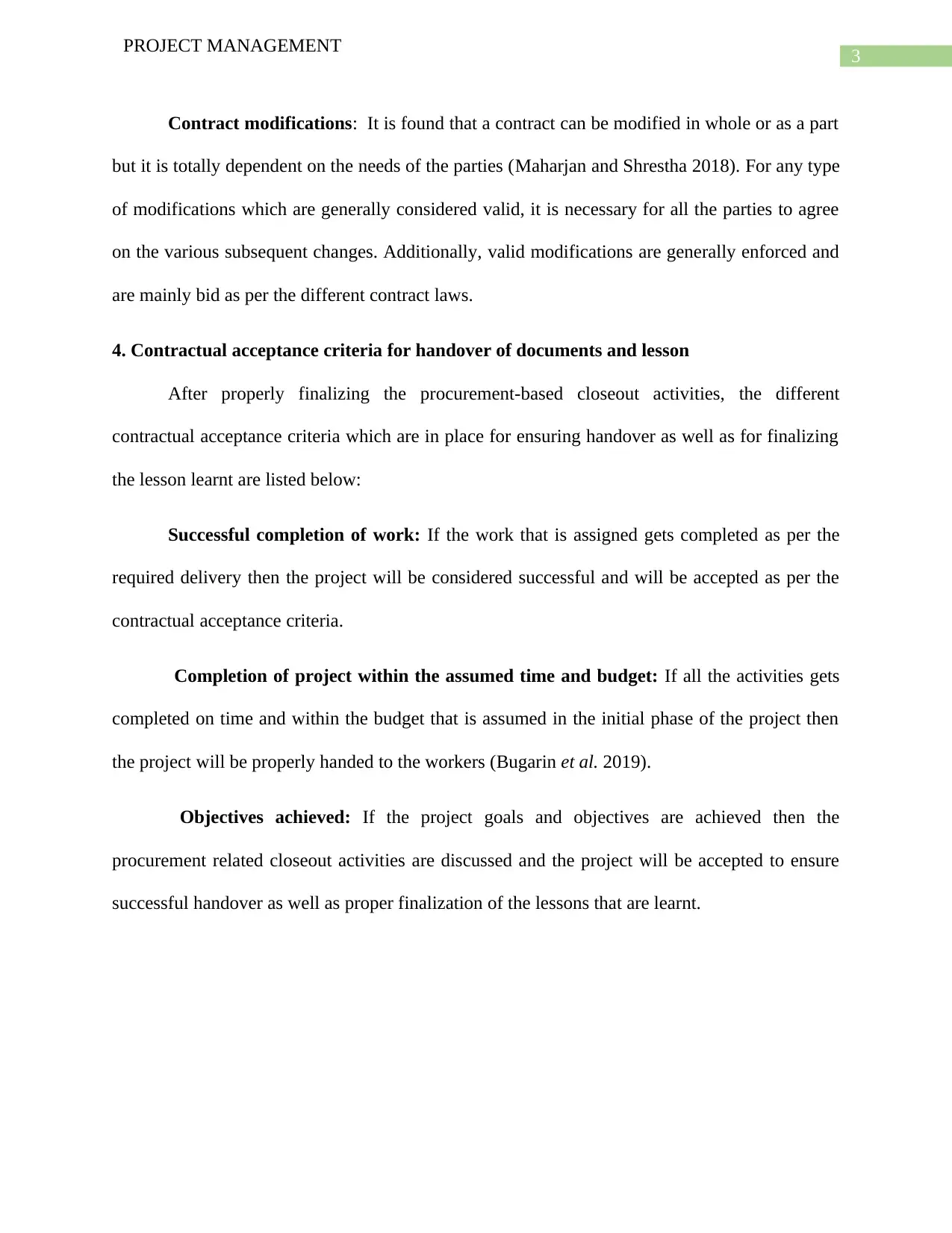
3
PROJECT MANAGEMENT
Contract modifications: It is found that a contract can be modified in whole or as a part
but it is totally dependent on the needs of the parties (Maharjan and Shrestha 2018). For any type
of modifications which are generally considered valid, it is necessary for all the parties to agree
on the various subsequent changes. Additionally, valid modifications are generally enforced and
are mainly bid as per the different contract laws.
4. Contractual acceptance criteria for handover of documents and lesson
After properly finalizing the procurement-based closeout activities, the different
contractual acceptance criteria which are in place for ensuring handover as well as for finalizing
the lesson learnt are listed below:
Successful completion of work: If the work that is assigned gets completed as per the
required delivery then the project will be considered successful and will be accepted as per the
contractual acceptance criteria.
Completion of project within the assumed time and budget: If all the activities gets
completed on time and within the budget that is assumed in the initial phase of the project then
the project will be properly handed to the workers (Bugarin et al. 2019).
Objectives achieved: If the project goals and objectives are achieved then the
procurement related closeout activities are discussed and the project will be accepted to ensure
successful handover as well as proper finalization of the lessons that are learnt.
PROJECT MANAGEMENT
Contract modifications: It is found that a contract can be modified in whole or as a part
but it is totally dependent on the needs of the parties (Maharjan and Shrestha 2018). For any type
of modifications which are generally considered valid, it is necessary for all the parties to agree
on the various subsequent changes. Additionally, valid modifications are generally enforced and
are mainly bid as per the different contract laws.
4. Contractual acceptance criteria for handover of documents and lesson
After properly finalizing the procurement-based closeout activities, the different
contractual acceptance criteria which are in place for ensuring handover as well as for finalizing
the lesson learnt are listed below:
Successful completion of work: If the work that is assigned gets completed as per the
required delivery then the project will be considered successful and will be accepted as per the
contractual acceptance criteria.
Completion of project within the assumed time and budget: If all the activities gets
completed on time and within the budget that is assumed in the initial phase of the project then
the project will be properly handed to the workers (Bugarin et al. 2019).
Objectives achieved: If the project goals and objectives are achieved then the
procurement related closeout activities are discussed and the project will be accepted to ensure
successful handover as well as proper finalization of the lessons that are learnt.
Paraphrase This Document
Need a fresh take? Get an instant paraphrase of this document with our AI Paraphraser
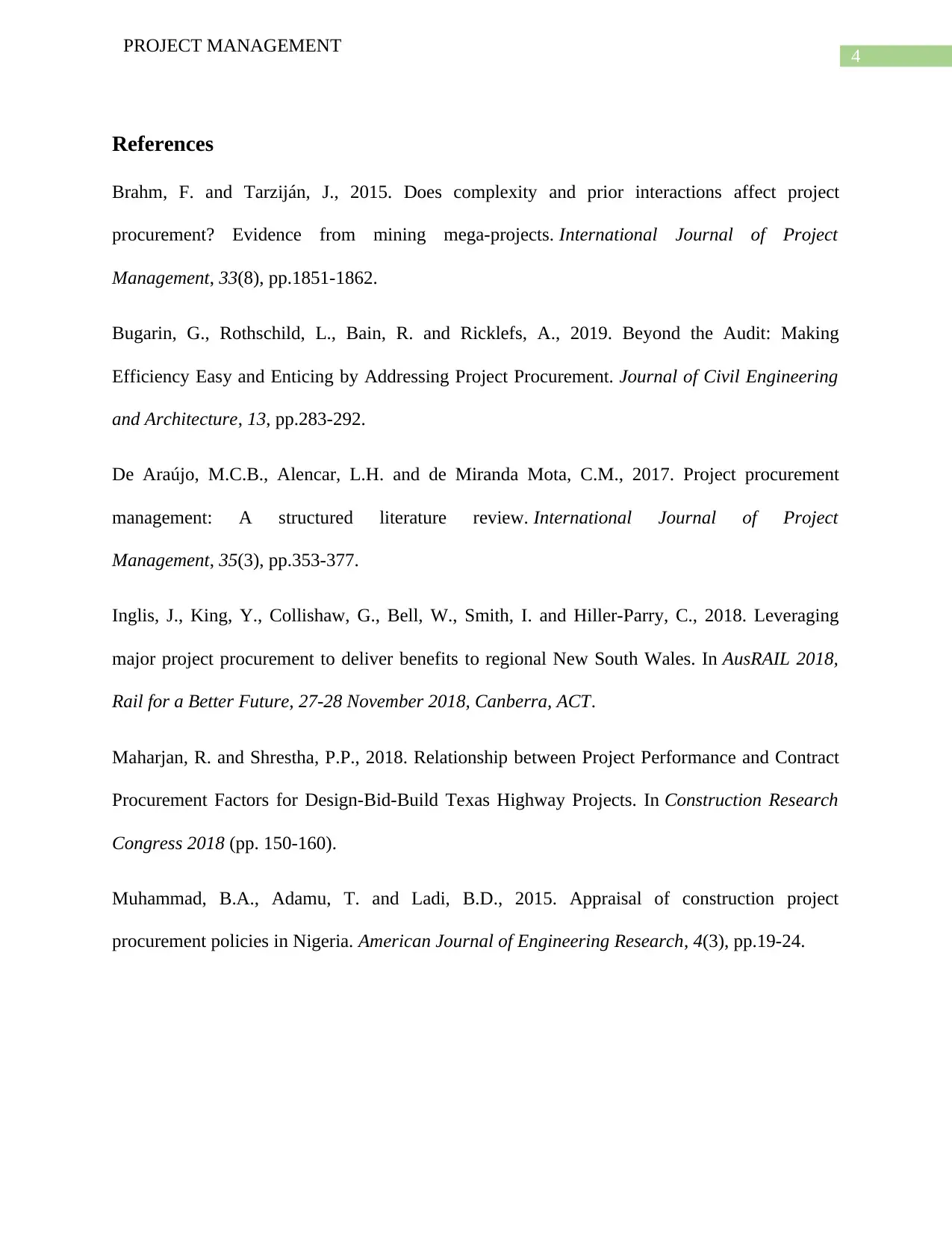
4
PROJECT MANAGEMENT
References
Brahm, F. and Tarziján, J., 2015. Does complexity and prior interactions affect project
procurement? Evidence from mining mega-projects. International Journal of Project
Management, 33(8), pp.1851-1862.
Bugarin, G., Rothschild, L., Bain, R. and Ricklefs, A., 2019. Beyond the Audit: Making
Efficiency Easy and Enticing by Addressing Project Procurement. Journal of Civil Engineering
and Architecture, 13, pp.283-292.
De Araújo, M.C.B., Alencar, L.H. and de Miranda Mota, C.M., 2017. Project procurement
management: A structured literature review. International Journal of Project
Management, 35(3), pp.353-377.
Inglis, J., King, Y., Collishaw, G., Bell, W., Smith, I. and Hiller-Parry, C., 2018. Leveraging
major project procurement to deliver benefits to regional New South Wales. In AusRAIL 2018,
Rail for a Better Future, 27-28 November 2018, Canberra, ACT.
Maharjan, R. and Shrestha, P.P., 2018. Relationship between Project Performance and Contract
Procurement Factors for Design-Bid-Build Texas Highway Projects. In Construction Research
Congress 2018 (pp. 150-160).
Muhammad, B.A., Adamu, T. and Ladi, B.D., 2015. Appraisal of construction project
procurement policies in Nigeria. American Journal of Engineering Research, 4(3), pp.19-24.
PROJECT MANAGEMENT
References
Brahm, F. and Tarziján, J., 2015. Does complexity and prior interactions affect project
procurement? Evidence from mining mega-projects. International Journal of Project
Management, 33(8), pp.1851-1862.
Bugarin, G., Rothschild, L., Bain, R. and Ricklefs, A., 2019. Beyond the Audit: Making
Efficiency Easy and Enticing by Addressing Project Procurement. Journal of Civil Engineering
and Architecture, 13, pp.283-292.
De Araújo, M.C.B., Alencar, L.H. and de Miranda Mota, C.M., 2017. Project procurement
management: A structured literature review. International Journal of Project
Management, 35(3), pp.353-377.
Inglis, J., King, Y., Collishaw, G., Bell, W., Smith, I. and Hiller-Parry, C., 2018. Leveraging
major project procurement to deliver benefits to regional New South Wales. In AusRAIL 2018,
Rail for a Better Future, 27-28 November 2018, Canberra, ACT.
Maharjan, R. and Shrestha, P.P., 2018. Relationship between Project Performance and Contract
Procurement Factors for Design-Bid-Build Texas Highway Projects. In Construction Research
Congress 2018 (pp. 150-160).
Muhammad, B.A., Adamu, T. and Ladi, B.D., 2015. Appraisal of construction project
procurement policies in Nigeria. American Journal of Engineering Research, 4(3), pp.19-24.
1 out of 5
Related Documents
Your All-in-One AI-Powered Toolkit for Academic Success.
+13062052269
info@desklib.com
Available 24*7 on WhatsApp / Email
![[object Object]](/_next/static/media/star-bottom.7253800d.svg)
Unlock your academic potential
Copyright © 2020–2025 A2Z Services. All Rights Reserved. Developed and managed by ZUCOL.





